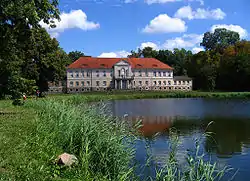Owińska
Owińska [ɔˈviɲska] is a village in the administrative district of Gmina Czerwonak, within Poznań County, Greater Poland Voivodeship, in west-central Poland.[1] It lies approximately 4 kilometres (2 mi) north of Czerwonak and 12 km (7 mi) north of the regional capital Poznań.
Owińska | |
|---|---|
Village | |
 Palace in the village | |
 Owińska | |
| Coordinates: 52°30′N 16°58′E | |
| Country | |
| Voivodeship | Greater Poland |
| County | Poznań |
| Gmina | Czerwonak |
| Population | 2,500 |
| Time zone | UTC+1 (CET) |
| • Summer (DST) | UTC+2 (CEST) |
Owińska lies close to the Warta river, on the main road and railway line from Poznań to Wągrowiec. In the village are a former Cistercian convent (now a school for the blind), a Renaissance church, and a palace built in late classical style (1804–1806).
World War II

Owińska was the location of a mental hospital where approximately 1,000 patients were murdered by Nazi Germany during World War II. They were shot in the back of the neck in the nearby forest. The victims were buried in 28 mass graves. In the second stage of the same "aktion" conducted after October 26, 1939, the remaining patients were taken to a bunker in Fort VII and gassed with carbon monoxide released from steel bottles. A year later, additional 200 patients from Poznań were brought in and gassed at the same location.[2]
From August 1943 to January 1945 the Germans operated a subcamp of the Gross-Rosen concentration camp in the village, whose prisoners were mostly Poles and Russians.[3]
References
- "Central Statistical Office (GUS) - TERYT (National Register of Territorial Land Apportionment Journal)" (in Polish). 2008-06-01.
- "Owinska Asylum and Fort VII". Tiergartenstrasse 4 Association. 2013. Retrieved September 21, 2013.
- "Subcamps of KL Gross- Rosen". Gross-Rosen Museum in Rogoźnica. Retrieved 18 April 2020.
